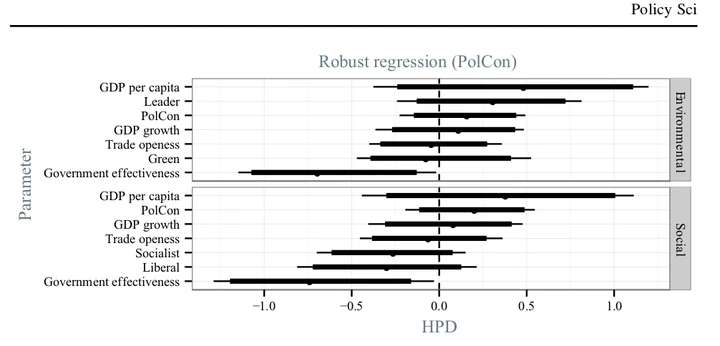Rule growth and government effectiveness: why it takes the capacity to learn and coordinate to constrain rule growth

Abstract
This paper asks whether strong bureaucracies can effectively constrain the continuously growing stock of rules in modern democracies through organizational coordination and learning. To answer this question, the paper analyzes the growth of rule stocks in the areas of environmental policy and social policy in 23 OECD countries over the period between 1976 and 2005. To do so, it develops a new measure of rule growth based on the content of laws and regulations rather than their length. The analysis highlights that effective bureaucracies are indeed better able to contain rule growth in these areas than weak bureaucracies. Since rules have to be implemented, countries suffering from bureaucratic capacity and quality constraints thus appear to be stuck in an implementation deficit trap. Appropriate implementation is not only inherently more challenging for countries with weak public administrations, but the body of rules to be implemented also tends to grow quicker in these countries.
"Rule growth and government effectiveness: why it takes the capacity to learn and coordinate to constrain rule growth" is an article by Christian Adam, Christoph Knill and Xavier Fernández i Marín published at Policy Sciences in 2016. This webpage contains supplemental online material that complements the published paper with DOI: 10.1007/s11077-016-9265-x.
The paper has been awarded with the the _Wissenschaftspreis Bürokratie_ of the Institut der deutschen Wirtschaft Köln (Cologne Institut for Economic Research), 2017.
Figures and videos of the evolution of government portfolios
Australia
Australia from Xavier Fernández i Marín on Vimeo.
Austria
Austria from Xavier Fernández i Marín on Vimeo.
Belgium
Belgium from Xavier Fernández i Marín on Vimeo.
Canada
Canada from Xavier Fernández i Marín on Vimeo.
Denmark
Denmark from Xavier Fernández i Marín on Vimeo.
Finland
Finland from Xavier Fernández i Marín on Vimeo.
France
France from Xavier Fernández i Marín on Vimeo.
Germany
Germany from Xavier Fernández i Marín on Vimeo.
Greece
Greece from Xavier Fernández i Marín on Vimeo.
Ireland
Ireland from Xavier Fernández i Marín on Vimeo.
Italy
Italy from Xavier Fernández i Marín on Vimeo.
Japan
Japan from Xavier Fernández i Marín on Vimeo.
Korea, Republic of
Korea, Republic of from Xavier Fernández i Marín on Vimeo.
Netherlands
Netherlands from Xavier Fernández i Marín on Vimeo.
New Zealand
New Zealand from Xavier Fernández i Marín on Vimeo.
Norway
Norway from Xavier Fernández i Marín on Vimeo.
Portugal
Portugal from Xavier Fernández i Marín on Vimeo.
Spain
Spain from Xavier Fernández i Marín on Vimeo.
Sweden
Sweden from Xavier Fernández i Marín on Vimeo.
Switzerland
Switzerland from Xavier Fernández i Marín on Vimeo.
Turkey
Turkey from Xavier Fernández i Marín on Vimeo.
United Kingdom
United Kingdom from Xavier Fernández i Marín on Vimeo.
United States
United States from Xavier Fernández i Marín on Vimeo.
Government effectiveness against rule growth

Code
The code for the empirical models in the BUGS/JAGS declarative language follows:
model {
for (s in 1:nS) {
for (c in 1:nC) {
YS[c, s, 1] ~ dt(mu[c, s], tau[s], nu[s]) # YS[,,1] refers to Means
mu[c, s] <-
theta[s, 1] * veto.players[c]
+ theta[s, 2] * gdp.capita[c]
+ theta[s, 3] * gdpc.ratio[c]
+ theta[s, 4] * gov.eff[c]
+ theta[s, 5] * trade[c]
+ theta[s, 6] * green[c]
+ theta[s, 7] * socialist[c]
+ theta[s, 8] * leaders.environmental[c]
+ theta[s, 9] * liberal.social[c]
}
tau[s] <- pow(sigma[s],-2)
sigma[s] ~ dunif(0, 4)
nu[s] <- 1 + (-1*log(nu.trans[s]))
nu.trans[s] ~ dunif(0, 1)
}
# Priors for main effects
for (v in 1:5) {
for (s in 1:nS) {
theta[s, v] ~ dnorm(Theta[v], tau.theta[v])
}
Theta[v] ~ dnorm(0, 0.001)
tau.theta[v] <- pow(sigma.theta[v], -2)
sigma.theta[v] ~ dgamma(1, 5)
}
theta[1, 6] ~ dnorm(0, 0.001) # environmental, green
theta[2, 6] <- 0 # social, green
theta[1, 7] <- 0 # environmental, socialist
theta[2, 7] ~ dnorm(0, 0.001) # social, socialist
theta[1, 8] ~ dnorm(0, 0.001) # environmental, leaders.environmental
theta[2, 8] <- 0 # social, leaders.environmental
theta[1, 9] <- 0 # environmental, liberal.social
theta[2, 9] ~ dnorm(0, 0.001) # social, liberal.social
# Missing data for Consensus
for (c in 1:nC) {
veto.players[c] ~ dnorm(0, 0.5)
}
}